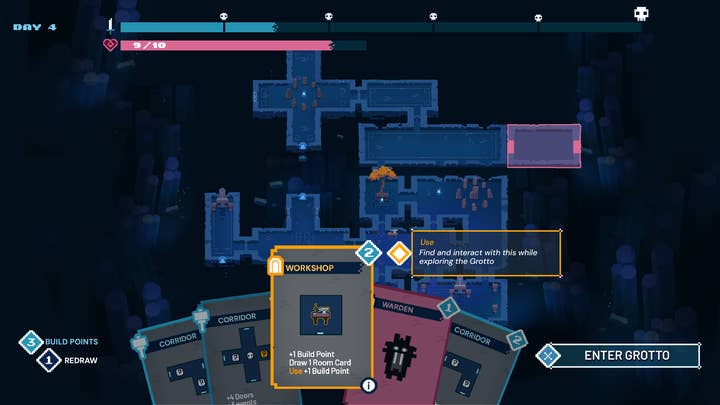'Singles, not albums': A guide to making smaller games | GI Sprint
Tony Gowland talks us through the benefits and best practices of developing more focused and frequent releases
UK studio Ant Workshop has embarked upon a significant shift in how it makes games, and it's one that managing director Tony Gowland believes could benefit a lot of developers.
The change follows the studio investing two years and approximately £750,000 into Dungeon Golf, a quirky take on mini-golf that Gowland tells us underperformed. Despite a five-figure marketing spend, and positive feedback from players and critics, the game "never managed to quite reach an audience."
Unable to invest further in the game or in any project of a similar size, the studio decided to take inspiration from publishers and their portfolio-centric strategies.
"What we needed to do is get more things out there and do it a bit quicker, a bit smaller, and being a bit more agile," Gowland explains. "Not falling into the trap of developing something for 15 months or whatever it was on Dungeon Golf before we even went public with it."
He discussed the idea with industry veteran and original Grand Theft Auto developer Gary Penn, who summed up Ant Workshop's new approach nicely.
"It's really irritating that he came up with this but it is a great line," Gowland laughs. "He said 'Okay, so if Dungeon Golf is an album, what you're making is singles.' And as soon as he said it, it was like, 'Yes, that's just the absolute perfect encapsulation of what this idea is.'
"We can't afford to make another album, and to be honest, it feels too risky to make another album. So let's bang out a few different things in different genres and different styles. We can afford to be a bit riskier with each individual little one, because you're making stuff on just a much smaller budget and a much smaller timescale, and just trying to get it in front of the audience a lot sooner."
Ant Workshop is attempting to develop games that each have a full budget of £50,000 to £100,000 and can be released after four to six months of work. Other developers have also experimented with shorter titles, such as Bithell Games' narrative shorts Quarantine Circular and Subsurface Circular.
Convinced this approach may be something that benefits other studios, Gowland shared his advice and offered more insight into his studio's strategy for GI Sprint.
Keep it small, keep it simple
Firstly, Gowland clarified that the four-to-six-month development time won't necessarily include prototyping, but encouraged developers to nail down a basic concept and mechanics as soon as possible. A large part of this is not designing games that are likely to become too complex.

"The key thing with the singles is that they are small games," he explains. "We're not trying so we're not trying to make something that's totally feature-packed. I doubt that we would make an online multiplayer game as any of these, for example, because that's way out of scope.
"It's about not going wild. It's a blessing and a curse – you have to be very disciplined with it, but it does mean that you can really focus down."
He points to an example from Dungeon Golf. The game featured a couple of commentators that would remark on what was happening in-game, apeing televised sports. But on reflection, Gowland and the team questioned whether this offered enough benefit considering the time spent working on them, and says he would have cut this if he were making the game again. Developers should be more brutal about which features are worth devoting development resources and time to, he advises.
Revisit past ideas (but, again, keep them simple)
Ant Workshop's first 'single' is Into The Restless Ruins, a roguelike deck builder where you use cards to attach new rooms and expand your dungeon.
This idea actually stemmed from a completely different game: a top-down 2D title where players were in charge of flying a plane. If your mission was to deliver a parcel, you would snap on a parcel delivery element to the plane. If the plane was on fire, you would snap on a hose that would douse the flames. But the central mechanic never quite fit.
"We went over it for certainly two or three weeks of trying to iterate on the plane flying bit, what's working and what's not working, and never quite got that bit feeling nice," Gowland explains. "But the bit where you're snapping new things onto your plane and then running around felt so good that the coder just put in a debug button where you could just keep generating new bits and keep snapping them on. It felt so satisfying to do that."
Ant Workshop decided to ditch the flying concept and focus on expanding the plane with new elements. This became the dungeon-building core of Into The Restless Ruins, something Gowland says "came together quite quickly."

Build something with legs
Smaller games do not have to be one-and-done affairs. Gowland encourages developers to think about replayability, but also 'expandability.' The idea of making singles is not to shun albums entirely, but to find the basis of what a future album might be.
"Every idea we're coming at has to be something that is extendable, something where we can rein the scope in for an initial launch and sell for a cheap price," he says. "And if that game finds an audience, that's great. We can keep making updates for this, we could do free content updates or DLC, or we could expand it for a sequel and that kind of thing."
Make your studio more flexible
Like many studios, Ant Workshop also works on co-development projects alongside its own games, but the scope of the latter can affect its ability to handle the former. During work on Dungeon Golf, taking on a co-dev project would have potentially thrown off the schedule as devoting a few coders to external work would have delayed development.
"But when you're working on much smaller things, if a couple of coders are needed for some other project for two months, that's fine, we have plenty of other things that we're working on," he says. "People can just adjust their time and shift around and deal with it that way. It's given us a lot more flexibility."
Gowland also says developers should not be afraid to pause work on one of their 'singles' if it's not quite coming together yet. For instance, one of the titles Ant Workshop is working on centres around "a street food van for monsters," where you serve customers as fast as you can.
"We've made an initial version of that," Gowland says. "The idea is good but it's not quite working. If you're working on this as a bigger thing, you would be like, 'Well, we've got artists that are making things, we've got coders, there's a machine that needs feeding here, and we need to just sit down and crunch through what's going wrong and try different things.' But because we have so many different 'singles' on the go at once, we'll just park that one for a little bit and then come back to it when we have an idea of what to do with it."
Tell people what you're working on
A crucial element of knowing which smaller games you should be devoting more time to is getting player feedback. This, Gowland says, was a key element in Dungeon Golf's failure as the studio kept it under its belt "way too long."
"You have to be very disciplined with [singles], but it does mean that you can really focus"
"With previous games like Dead End Job, we've taken it out to little local events and shows, or even EGX Rezzed," he explains. "[With Dungeon Golf], we'd just gotten a little bit too much in our own heads of 'OK, we'll keep working on it until we think it's ready to show people.' That point of feeling it's ready to show people just stretched on and on and on, and ultimately, unfortunately, it just never managed to find a market – and I'm not sure that the size of the market that it would have needed actually exists for the type of game that it is."
Showing your game earlier gives you a better sense of the potential audience it might reach, as well as building up anticipation and those all-important wishlists.
Smaller games lend themselves to smaller price points
Ant Workshop is currently planning to charge a maximum of £5 for each of its 'singles', something Gowland believes makes them more of an "impulse purchase," similar to gamers' propensity for snapping up cheaper titles in Steam sales. He likens it to his childhood of taking his pocket money to the market each week and seeing which Acorn Electron titles he could afford..
"Sometimes you get things that are absolutely incredible and that's great, and sometimes you get things that were absolutely rubbish – but it's a cheap thing. You are taking a punt on a sort of pocket money-based thing. We've seen plenty of games now coming out on Steam that are decent quality, well-made things, and people are launching them for £4 or £5."
He adds that lower price points also keep player expectations in check.
"With things being cheaper, there's less expectation of super high-quality art fidelity and that kind of thing – look at something like Vampire Survivors," he says. "As long as you're quite clear to people. You need to be able to go, 'Look, we're not developing a full, massive thing, but it is a little thing that you could enjoy and has a lot of replayability'."
Re-evaluate your metrics for success
Gowland asserts that the break-even point for games scales up and down at a similar rate to the budget. He estimates that Ant Workshop would ideally need to be able to sell 20,000 units of its 'singles' for them to break even.
Again, the price point comes into play here; while it's no easy thing to sell 20,000 units, it's less challenging to do so at an impulse price than "at a price where people are waiting for it to go on sale on Steam instead."
And Gowland emphasises his original point about this being similar to how publishers handle their portfolios.
"We're not expecting every one of these to break even and cover themselves. A quarter of them might, maybe less than that, but as they each make something. We'll also get a lot of information and feedback from actual real players.
"Because you're making a much smaller bet on each individual one, you can afford to spread that and figure things out. I expect that, even into the second year of doing this, we'll start to get a lot more refined. We can go, 'This was popular so we can how about we try taking those bits and making something out of them and then see what happens with that?'"
Gowland will also appear on tomorrow's GI Sprint panel about the art of failing fast, another vital element of making games cheaper, faster and better.

